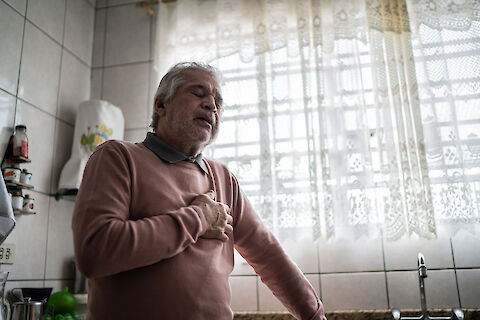
February is the month of love and the time to raise awareness about heart health in the United States because it's American Heart Month. This makes it an opportune time to talk about a serious health concern for seniors: heart attacks. Senior heart health is a critical subject, especially with the rising instances of heart disease among the elderly population. The greatest defense we have against this situation is knowledge and timely action.
We want to offer caregivers an action-oriented guide on what to do if a senior in their care is suspected to be having a heart attack. We understand that every second counts in these situations. Let's focus on recognizing the symptoms promptly and contacting emergency services quickly.
Heart Attacks in Older Adults
Heart attacks occur when blood flow to the heart muscle is disrupted, often due to a blockage in the coronary arteries. This can damage or destroy the heart muscle, making it a life-threatening situation. Seniors are particularly at risk due to age-related changes in the heart and blood vessels and often have other conditions, such as high blood pressure or diabetes, that increase their risk. Recognizing the symptoms of a heart attack promptly can make all the difference in minimizing damage and increasing the chances of survival.
Recognizing a Heart Attack
Heart attack symptoms can vary significantly among individuals and between men and women. What may seem like indigestion or heartburn could be warning signs of a heart attack. Common symptoms include:
- Chest pain or discomfort
- Shortness of breath
- Cold sweat
- Nausea
- Lightheadedness
- Discomfort in other body areas like the arms, back, neck, jaw, or stomach
It's crucial to note that these symptoms may occur suddenly or develop slowly over time. The key is to act promptly – never ignore these symptoms.
What to Do if a Senior Is Having a Heart Attack
If you suspect a senior in your care is having a heart attack, the first and most important thing is to call 911 immediately. Next, attempt to calm them while help is on the way. Comfort them and reassure them that help is coming. Try to keep them in a comfortable position and discourage any physical activity. While waiting, every second is critical. Understanding the warning signs and acting upon them promptly is crucial.
Creating a Personalized Plan
Every senior is unique and may have different health concerns and needs. Create a personalized plan with their doctor outlining step-by-step actions during a heart emergency.
This plan should include details like the senior's medical history, current medications, allergies, contact information for key doctors, and locations of the nearest hospital and emergency room. It should also specify steps to take if a suspected heart attack occurs, such as who to call, what information to provide, and what immediate actions to take.
This plan provides a clear guideline during emergencies and empowers the caregivers to act swiftly and decisively, potentially saving a life. Knowing they are prepared for such an event gives caregivers confidence and peace of mind.
Have More Questions?
At Senior Helpers LaGrange, we understand the importance of providing speedy and efficient care for seniors during these emergencies. For those living in LaGrange, Columbus, West Point, and Pine Mountain, our caring and professional team is ready to assist you and your senior loved ones.
As we mark American Heart Month, it's time to redouble our efforts to safeguard our seniors. Better knowledge, preparedness, and timely action can make all the difference. Contact us today, and let us assist you in ensuring the best care for your loved ones.